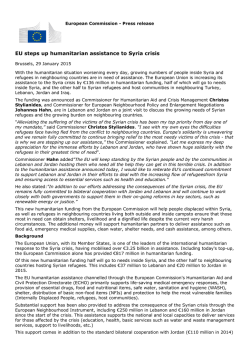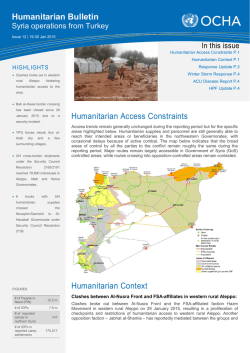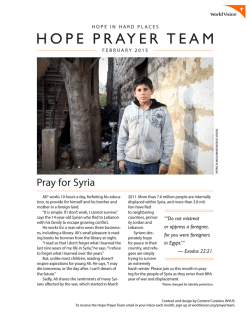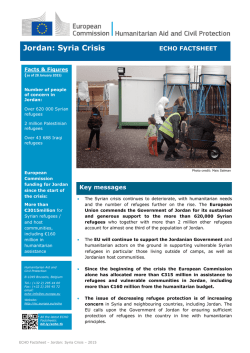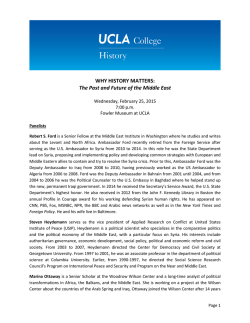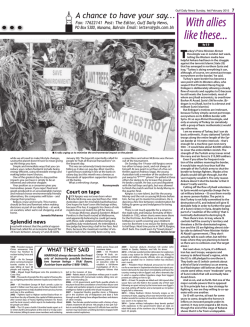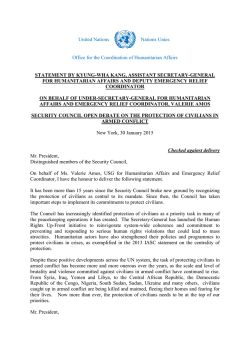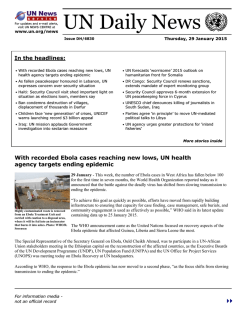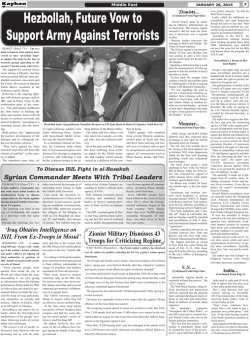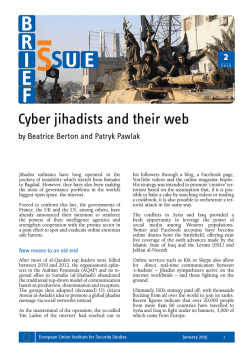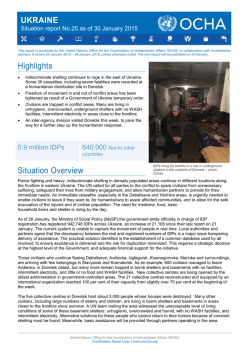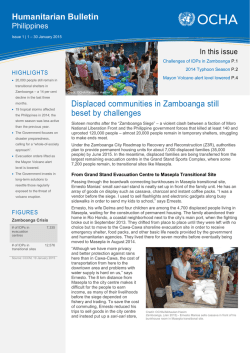
United Nations Nations Unies
United Nations Nations Unies Office for the Coordination of Humanitarian Affairs UNDER-SECRETARY-GENERAL FOR HUMANITARIAN AFFAIRS AND EMERGENCY RELIEF COORDINATOR, VALERIE AMOS SECURITY COUNCIL BRIEFING ON SYRIA New York, 28 January 2015 Checked against delivery Mr. President, Distinguished members of the Security Council, On behalf of Ms. Valerie Amos, USG for Humanitarian Affairs and Emergency Relief Coordinator, I have the honour to deliver the following statement. Syria is entering its fifth year of conflict characterized by extreme violence and brutality. Resolution 2139 called for an end to the indiscriminate employment of weapons in populated areas including shelling and aerial bombardment, and the use of barrel bombs. But the call continues to be ignored. The Government has continued to conduct airstrikes, including barrel bombs, in densely populated areas. Between 21 and 26 January, Government airstrikes on East Ghouta in Rural Damascus reportedly killed nearly 100 people and injured scores more. Armed opposition groups, and designated terrorist organizations, have also continued to use explosive weapons in populated areas. A barrage of around 50 rockets and mortars killed at least seven and injured 50 in Damascus city on 25 January. Mr. President, Infrastructure for essential services continues to come under deliberate and indiscriminate attack. For example, for nearly two weeks, Al Nusra Front has cut water supplies to Idleb city, affecting some 600,000 people. In response, local government authorities are preventing the delivery of aid to opposition controlled areas. Hospitals and schools have not been spared. Physicians for Human Rights documented eight attacks on medical facilities during December, six of them by government forces. They also documented the deaths of seven medical personnel during the same period - all killed by government forces, including three who were reportedly tortured to death and one who was executed. At least three schools were reportedly hit by Government airstrikes in Idleb governorate in December, killing nine children and injuring many others. Meanwhile the atrocities meted out by ISIL continued in areas under their control, including numerous reports of executions, including by stoning and throwing victims from buildings. Their brutal subjugation of women and girls is particularly heinous, and the fate of the women sold into sexual slavery remains deeply concerning. Mr. President, The relentless violence and destruction in Syria has led to one of the worst displacement of people the world has seen in decades. 7.6 million people are displaced within the country, many of them multiple times from one unsafe area to the next, in addition to 3.8 million refugees in the neighbouring countries. Humanitarian organizations continue to strive to help people in desperate need despite extremely difficult and unsafe operating environment inside the country. Food was distributed to over 3.6 million people in December; emergency non-food items were provided to over 500,000; water and sanitation interventions for some 1.5 million; and medical assistance for over 680,000 via regular, cross line and cross border deliveries. In addition, international and Syrian NGOs reached 1.5 million across all sectors. United Nations cross border deliveries from Turkey and Jordan into Syria continue to increase. As of 26 January, 59 shipments have been made under the terms of resolutions 2165 and 2191. These deliveries provided food assistance for over 702,000 people, non-food items for over 615,000, water and sanitation supplies for 311,000, and medical supplies for over 468,000 people. WFP reached 315,000 people in rural parts of Dar’a, Quneitra, Idleb, and eastern Aleppo city in December via cross border operations, and plan to scale up further next month, but need more funds to do so. Despite these efforts needs continue to outpace response. Some 4.8 million people, or around 40 per cent of the total 12.2 million people in need of humanitarian assistance, are residing in areas where they struggle to receive basic services and secure basic staples and where humanitarian access remains a significant challenge. Access to ISIL controlled Raqqa and Deir ez Zor is particularly concerning. UN agencies were unable to deliver food to the entire caseload of 600,000 people in these two governorates in December due to lack of agreement with armed groups on the ground. Many local NGOs in Raqqa have put humanitarian activities on hold, and in the past week some humanitarian organizations in the governorate were closed. We regret to report no progress has been achieved on inclusion of surgical supplies in cross line humanitarian convoys. In December, injectable medicines and surgical supplies were denied to areas in Eastern Ghouta. In January, despite the support of the Governor of Homs, Government security forces removed all surgical items, diarrhoea kits, midwifery kits and reproductive health kits from the interagency convoy to Al Wa’er, in breach of international humanitarian law. Some 212,000 people are still besieged – 185,500 people by Government forces and 26,500 people by opposition forces, with limited aid reaching only two locations since 1 December. Beginning 24 December, some 9,000 people, including children and sick and wounded civilians, were able to evacuate towns in Eastern Ghouta, some of them reportedly from besieged areas, as a result of local agreements between the parties. We have consistently reported on the severity of conditions inside Eastern Ghouta, where aid deliveries continue to be heavily restricted. In 2014, 16 requests to the Government for interagency convoys to Eastern Ghouta were made, only four of which were carried out. The remaining 12 were unanswered, denied or subjected to conditions that could not be accommodated. This past week a further four requests were made to reach the area and we await a response. No assistance has reached Yarmouk camp for Palestinians since 6 December due to ongoing fighting inside and around the camp. Previous deliveries were already sporadic and insufficient to constitute sustained and adequate coverage of the needs of some 18,000 people inside the camp. Although one additional international non-government organization was approved in January there has been no progress on addressing the administrative constraints placed on international NGOs by the Government of Syria. International NGOs have vast experience and much needed capacity, making them a crucial partner in the effort to meet ever-growing needs in Syria. Mr. President, In order for humanitarian agencies to continue their work more funding is urgently required. The Syria response is now contained in a single plan and appeal, inclusive of assistance both from within the country and through cross border operations. The response to people inside Syria requires $2.9 billion this year. Last year, we received 48 per cent of the amount requested. Lack of funding for example, for the winterization programme, means that hundreds of thousands among the 3.3 million people targeted for assistance have not received assistance, during this particularly harsh winter. Mr. President, This Council must find a way to end the conflict in Syria. At the beginning of the conflict, nearly four years ago, 1 million people needed humanitarian assistance inside the country. Today, that figure stands at 12.2 million. 3.8 million people have fled to neighbouring countries. Mr. President, We must not allow the world to forget Syria and the atrocities being committed against its people. Thank you.
© Copyright 2026
